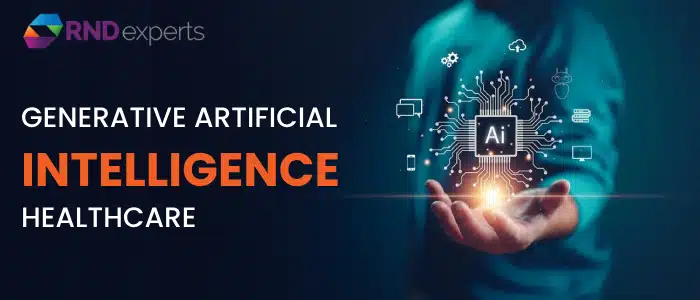The Role Of Generative Artificial Intelligence in Healthcare
September 21, 2023
Technology
Admin

INTRODUCTION:
Generative Artificial Intelligence has great potential to transform the healthcare industry. Generative Artificial Intelligence provides powerful tools for analyzing the full medical data and will help to make accurate diagnoses. This will also help to create personalized treatment plans. Today we will discuss Generative Artificial Intelligence role in the healthcare industry, its potential benefits and challenges, and discuss the future direction of this rapidly evolving field.
How does Generative Artificial Intelligence work?
Generative Artificial Intelligence (GAI), like GPT-3, uses complex algorithms and neural networks to create human-like content, such as text, images, and audio, by learning patterns from large data sets. GAI has diverse applications across industries, from language processing to art, transforming content creation with human-like automation. Generative AI algorithms use deep learning techniques or machine learning models to learn from large amounts of data & generate new content similar to the input data.
How Can Generative Artificial Intelligence used in the healthcare industry?
In the circumstances of healthcare, generative AI can be used to:
Like new medical images, such as X-rays or MRIs
It helps to generate personalized treatment plans based on a patient’s medical history and other factors.
What are the Benefits of Using Generative AI in Healthcare?
In recent years, the healthcare industry has been undergoing a transformation, driven by the relentless advancement of technology. One of the most promising developments is the integration of generative artificial intelligence (AI) into various aspects of healthcare. Generative AI, a subset of artificial intelligence that focuses on creating new content, has begun to revolutionize the way healthcare professionals diagnose, treat, and improve patient care. Let’s explore the remarkable benefits of using generative AI in healthcare.
Enhanced Diagnosis and Prediction:
Generative AI can analyze vast amounts of patient data, including medical records, images, and genetic information, to assist healthcare providers in making more accurate diagnoses and predictions. Machine learning algorithms can identify patterns and anomalies that might go unnoticed by human practitioners, leading to earlier detection of diseases and more effective treatment plans.
Personalized Treatment Plans:
Every patient is unique, and generative AI can help create personalized treatment plans tailored to an individual’s specific medical history, genetics, and lifestyle. Generative AI can optimize drug dosages, recommend suitable therapies, and even predict how a patient might respond to a particular treatment.
Drug Discovery and Development:
Developing new drugs is a time-consuming and expensive process. Generative AI can accelerate drug discovery by simulating molecular structures, predicting potential drug interactions, and identifying novel drug candidates. This not only accelerates the development of new medications but also reduces research and development costs.
Telemedicine and Remote Monitoring:
Generative AI empowers the growth of telemedicine by providing real-time analysis of patient data remotely. Through wearable devices and sensors, AI can continuously monitor patients, alerting healthcare providers to any concerning changes in vital signs or health status. This proactive approach to healthcare can improve patient outcomes.
Healthcare Workflow Optimization:
AI-powered chatbots and virtual assistants can streamline administrative tasks, such as appointment scheduling and medical record management. This allows healthcare professionals to focus more on patient care, ultimately enhancing the overall efficiency of healthcare systems.
Medical Imaging and Radiology:
Generative AI has shown remarkable promise in the field of medical imaging. AI algorithms can assist radiologists in interpreting complex images like X-rays, MRIs, and CT scans, reducing the risk of human error and providing quicker results. This speeds up the diagnostic process and can be crucial in emergency situations.
Research and Publications:
Researchers can benefit from generative AI by automating literature reviews and data analysis. AI can sift through vast amounts of scientific literature, extracting relevant information and insights, which can accelerate the pace of medical research and innovation.
Patient Engagement and Education:
Generative Artificial Intelligence can also improve patient engagement by providing personalized health recommendations, educational materials, and even mental health support through chatbots and virtual assistants. This empowers patients to take an active role in their healthcare journey.
Conclusion:
In conclusion, Generative Artificial Intelligence holds massive potential for transforming the healthcare industry. By harnessing the power of artificial intelligence, healthcare professionals can provide more accurate diagnoses, personalized treatment plans, and improved patient care.
Moreover, it has the capacity to enhance research, optimize workflows, and make healthcare more accessible through telemedicine. As generative AI continues to evolve, it’s clear that its integration into healthcare is poised to deliver profound benefits for both patients and providers, ushering in a new era of healthcare innovation. You can grab more knowledge related to Generative Artificial Intelligence at the RND experts blog. Keep following for more informative content.





